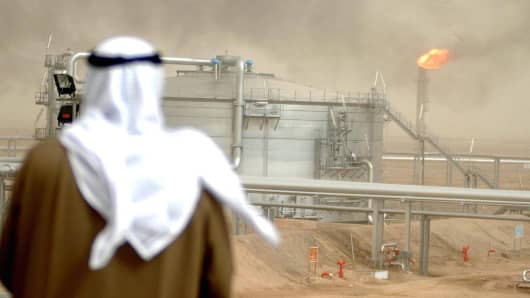Oil prices fell once again Thursday, after a minister from
the Organization of the Petroleum Exporting Countries (OPEC) said the
group did not have a choice with regards to cutting oil production
because it did not want to lose its global market share.
Speaking to reporters in Kuwait City, Ali al-Omair, the Kuwaiti oil minister, said the dramatic drop in the price of oil would affect the country's revenues and its fiscal budget for the year, Reuters reported Thursday.
"Within OPEC we don't have any other choice than
keeping the ceiling of production as it is because we don't want to lose our share in the market," he said Thursday morning, according to the news agency.
"If there is any type of arrangement with (countries) outside OPEC, we will be very happy."
Speaking to reporters in Kuwait City, Ali al-Omair, the Kuwaiti oil minister, said the dramatic drop in the price of oil would affect the country's revenues and its fiscal budget for the year, Reuters reported Thursday.
"Within OPEC we don't have any other choice than
keeping the ceiling of production as it is because we don't want to lose our share in the market," he said Thursday morning, according to the news agency.
"If there is any type of arrangement with (countries) outside OPEC, we will be very happy."
Weak global demand and booming U.S. shale oil production
are seen as two key reasons behind the price plunge, as well as OPEC's
reluctance to cut its output. OPEC is next due to meet in June, when it
will decide on its output policy after deciding to keep its production
steady at the end of 2014.
Rumors of an unscheduled meeting in January were quashed by United Arab Emirates Oil Minister, Suhail bin Mohammed al-Mazroui, who said he was adamant the strategy would not change. The group produces about 40 percent of the world's crude oil.
Prices have slumped around 60 percent since last June and tipped lower again on Thursday morning after a volatile week. The drop was compounded by a larger-than-expected build up in U.S. crude inventories, according to new data on Wednesday.
West Texas Intermediate (WTI) futures fell 3 percent on Thursday morning to 43.31 a barrel by 8:00 a.m. GMT, close to six-year lows. Brent crude futures fell to $55.10 a barrel.
Rumors of an unscheduled meeting in January were quashed by United Arab Emirates Oil Minister, Suhail bin Mohammed al-Mazroui, who said he was adamant the strategy would not change. The group produces about 40 percent of the world's crude oil.
Prices have slumped around 60 percent since last June and tipped lower again on Thursday morning after a volatile week. The drop was compounded by a larger-than-expected build up in U.S. crude inventories, according to new data on Wednesday.
West Texas Intermediate (WTI) futures fell 3 percent on Thursday morning to 43.31 a barrel by 8:00 a.m. GMT, close to six-year lows. Brent crude futures fell to $55.10 a barrel.
'Huge build' in crude stocks
This week's U.S. petroleum report was bearish for crude,
according to Michael Wittner and Ashish Karel, two analysts from Societe
Generale.
"The highlights of the week were a huge build in crude stocks," they said in a note late Wednesday.
"Looking ahead, we expect the WTI versus Brent discount to narrow in the (second quarter of 2015). In April, refinery runs should increase in the U.S. but drop in Europe and Asia, due to planned maintenance."
The build up in stocks comes despite a fall in the amount of operational rigs in the U.S.
Analysts at Citi, headed by Eric Lee, said this should "eventually" slow down U.S. production growth, but state that this isn't happening yet despite storage tanks filling up toward "critically high levels."
"The highlights of the week were a huge build in crude stocks," they said in a note late Wednesday.
"Looking ahead, we expect the WTI versus Brent discount to narrow in the (second quarter of 2015). In April, refinery runs should increase in the U.S. but drop in Europe and Asia, due to planned maintenance."
The build up in stocks comes despite a fall in the amount of operational rigs in the U.S.
Analysts at Citi, headed by Eric Lee, said this should "eventually" slow down U.S. production growth, but state that this isn't happening yet despite storage tanks filling up toward "critically high levels."


No comments:
Post a Comment